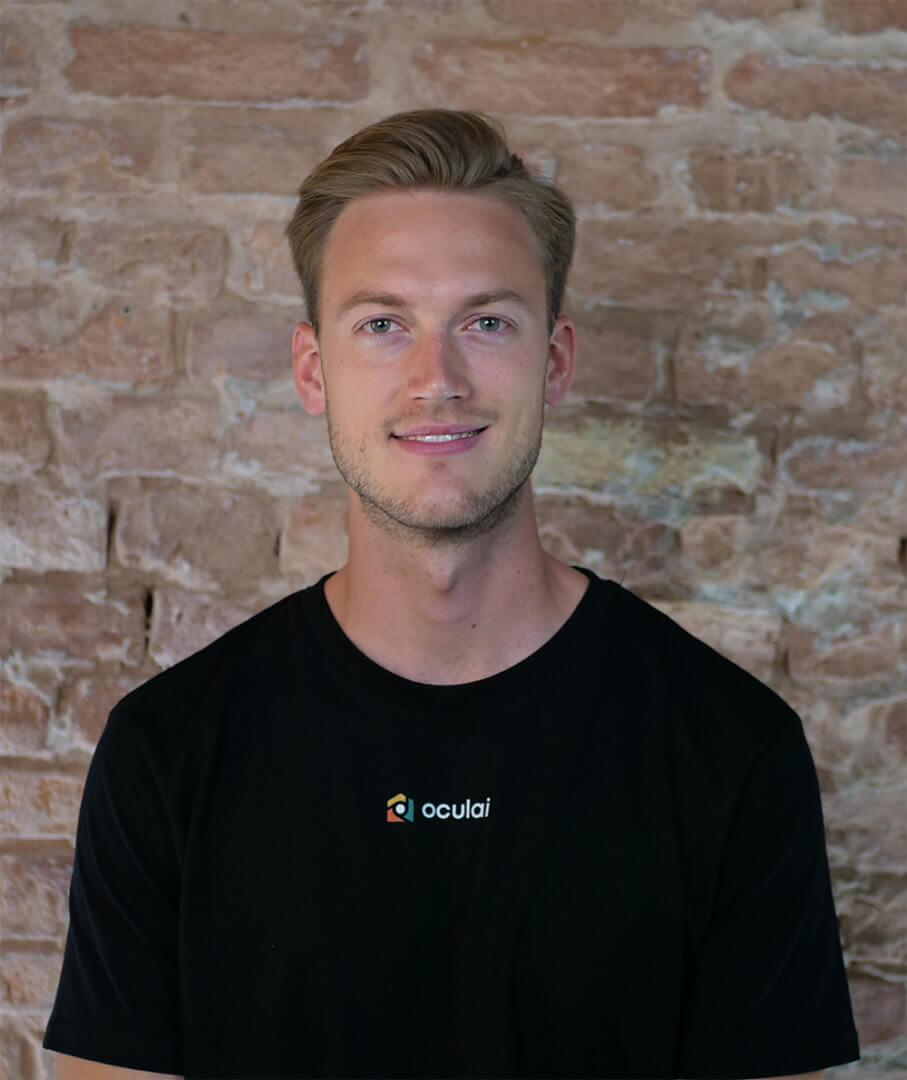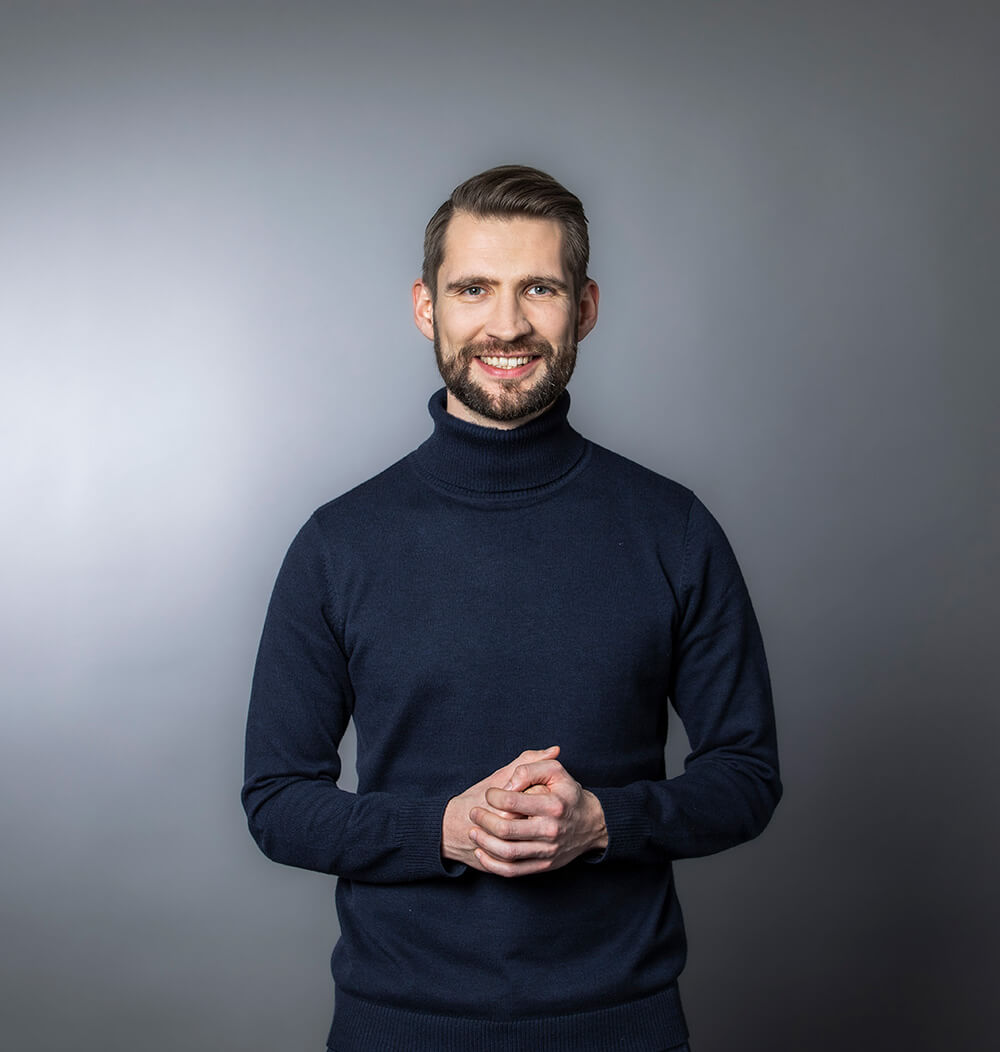HTGF’s 700th investment: How oculai is revolutionising the construction industry
Marking High-Tech Gründerfonds’ 700th investment, the start-up oculai is revolutionising the construction industry with its innovative AI technology. Four of Germany’s five largest construction companies are already working with the construction tech start-up. We sat down for a chat with oculai founder Constantin Kauffmann and HTGF Senior Investment Management Dominik Lohle.
Constantin, congratulations on the successful financing round. Can you explain what oculai does exactly?
Constantin Kauffmann: Sure. Our technology gives users the ability to track progress and work processes on construction sites in a fully automated manner. We film the construction site, while our AI and computer vision models analyse the data. This helps ensure that construction processes are documented seamlessly with great precision.

How can this data be used?
Constantin Kauffmann: On construction sites you don’t really see the sort of data feedback you might expect from the production systems in other industries. It is really important to document construction processes as there are many things that can cause a problem, but it’s incredibly complex. We overcome this challenge with the aid of an automated target/actual schedule, or daily construction reports that are generated automatically, for example. And on top of that, construction companies gain the ability to track and improve their core processes.
What do you mean exactly?
Constantin Kauffmann: Let me give you an example: We can analyse how many hours of work are needed to process one tonne of steel in a structure. Construction firms can then use this information on the amount of effort involved to make calculations and optimise their processes. We give them access to this data via our platform. Then they can more accurately calculate their benchmarks and the expense involved.
Dominik, what was it about oculai that impressed you? Aside from the technology, presumably the fact that oculai had already built up a customer base?
Dominik Lohle: That was a very important aspect. I find it quite remarkable that oculai has already been able to gain customers such as Zech and Köster at such an early stage. And on top of that, we kept hearing from discussions and business analyses that the technology has the potential to become a game changer for the industry. The feedback from real-world applications was very positive.

What did people have to say?
Dominik Lohle: Thanks to the oculai technology, many site managers report being able to spot any hiccups on the construction site from their office. I’ve heard about how a young site manager was able to handle a major construction project all on her own with the aid of oculai. The project would normally have required a team of two or three experienced site managers.
How is the construction industry doing in general when it comes to digitalisation?
Constantin Kauffmann: It’s facing major challenges with digitalisation. After all, the work itself is highly manual. It requires a lot of effort, with ever-changing tasks and challenges. Many project management tools work really well in the office, but not in the harsh environment of a construction site. That’s why 80 percent of site supervisors – the people who monitor construction progress – still walk around the site with a pen and paper. That’s something we can change.
Dominik Lohle: We’re currently experiencing a radical change in the construction industry: The market is unsettled. The boom phase of the past few years seems to be over. And the mood is subdued. For many companies, efficiency and effectiveness are key in this situation. And that’s exactly what the oculai technology can deliver.
Constantin, how does your technology work exactly?
Constantin Kauffmann: We install cameras and mobile communication modules on the cranes in operation on site. That provides us with video streams from a bird’s eye view of the entire construction site. These images are then sent directly to our cloud. We then apply various computer vision models in the cloud, enabling us to detect what type of work is being performed at each part of the construction site at a given time.
How detailed is the data?
Constantin Kauffmann: We can determine the construction stage of the work being performed, and the floor of the building. We can currently differentiate between 36 different processes, such as the pouring of concrete for use in ceilings. The image quality is good enough for the AI but is not clear enough for people to be identified, meaning that no direct personal data is collected. We then also incorporate external information into the analysis, such as the weather and quantity data. This gives us a complete picture, and we can share the information with the construction company to support their monitoring processes.
Dominik, you’re very active in the field of AI and computer vision. What are the challenges that young companies encounter in this field?
Dominik Lohle: The challenges that companies face in this area are often very similar: You start off with only a small amount of data to train the technology. In moments like this, computer vision can also become a manual process. When, in the case of oculai, you have to mark and tag construction site zones and structures in pictures, and manually track processes. The young company navigated this stage quite well, and was quickly able to achieve success and make strides.
What progress are you planning to achieve next, Constantin?
Constantin Kauffmann: The financing round not only provided us with capital, as we were also actively seeking loyal partners and a good network. And we found them. Now, we intend to capitalise on these new capabilities and turn our full attention to further developing the product and the company. And to distributing the solution more widely on the market. We’ve come a long way. And we’ve still got a long way to go, but I’m looking forward to the journey.
Thanks for your time, Constantin and Dominik!

